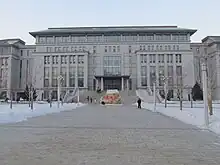Harbin Engineering University
Harbin Engineering University (HEU; Chinese: 哈尔滨工程大学) is a public technological university in Harbin, China. It was founded in 1953. The university is designated as a Double First Class University and a former Project 211 university.[1][2] HEU offers more than 150 degree programs, among them 48 are conducted in English.[3]
 | |||||||
Former names | Harbin PLA Military Engineering Institute, Harbin Shipbuilding Engineering Institute | ||||||
|---|---|---|---|---|---|---|---|
| Motto | 大工至善,大學至真 | ||||||
| Type | Public | ||||||
| Established | 1953 | ||||||
| President | Yao Yu (姚郁) | ||||||
Academic staff | 3,198 | ||||||
Administrative staff | 2,600 | ||||||
| Undergraduates | 24,979 | ||||||
| Postgraduates | 8,788 | ||||||
| Location | , , China | ||||||
| Campus | Urban, 311.60 acres (126.1 ha) | ||||||
| Website | www | ||||||
| Chinese name | |||||||
| Simplified Chinese | 哈尔滨工程大学 | ||||||
| Traditional Chinese | 哈爾濱工程大學 | ||||||
| |||||||
History
HEU traces its origins to the PLA Military Engineering Institute established in Harbin on September 1, 1953, with technical support from the Soviet Union after the Korean War. In 1966, the university became a local and non-military university and was renamed Harbin Engineering College. In 1970 the old university was however dismissed due to the tension at the border with the then Soviet Union. The major part of the old university, including university-level administration, was moved inland to Changsha, Hunan Province. A few other departments were also moved inland but to other places. The part that remained in Harbin formed a new university and was renamed as Harbin Shipbuilding Engineering Institute (HSEI; Chinese: 哈尔滨船舶工程学院; pinyin: Hāěrbīn Chuánbó Gōngchéng Xuéyuàn).
The current name has been in use since 1994.[4]
HEU was one of the first universities authorized by the state to award master and doctoral degrees.[5]
Campus

HEU is located in Nangang, in the heart of Harbin.
The university library occupies a six-story building on the eastern side of campus. Particular strengths of library collections focus on nuclear and marine science.
Wi-Fi access at the library is charged at 0.30 RMB per hour. Faculty, students, and staff with a university ID card may register for wifi access at the second-floor information desk.[6]
Admissions
Undergraduate, master and doctoral students are admitted in the autumn semester. Although the majority of undergraduate courses are taught in Chinese, many postgraduate programs are offered in English. Qualifications in related programs are required for postgraduate admissions.
International Students
HEU emphasizes the development of international cooperation and academic exchange. Since 2000, HEU have international students from Canada, Korea, Russia, Japan, Pakistan, Philippines, Mongolia, Thailand, Nepal, India, United Kingdom, and United States.
Academics
The university awards undergraduate, master, and doctoral degrees in the various branches of engineering, science, literature, management, and economics. The university is especially known for its vessel engineering industries.
International students seeking to improve their Chinese-language proficiency may enroll in a non-degree language course in either autumn or spring.
Research
As scholars at national key university, HEU faculty prioritize engineering in shipbuilding, information and communications, nuclear power, and hydroacoustics.
HEU is one of the Seven Sons of National Defence.[7]
The university is home to more than 40 research centers and institutes including:[8]
- Nuclear Power Safety and Simulation Introduction Base
- Deepwater Engineering Research Center
International cooperation
The university has established relationships with more than 20 international universities and research institutions, coordinating visiting scholars and cooperative research development.[9]
References
- "Introduction to Degree Programs Instructing in English". Archived from the original on 3 March 2016. Retrieved 15 July 2015.
- "教育部 财政部 国家发展改革委 关于公布世界一流大学和一流学科建设高校及建设 学科名单的通知 (Notice from the Ministry of Education and other national governmental departments announcing the list of double first-class universities and disciplines)".
- "Introduction to Degree Programs Instructing in English". Archived from the original on 3 March 2016. Retrieved 15 July 2015.
- Brief Introduction Archived 2013-12-13 at the Wayback Machine
- Programs Offered in HEU Archived 2013-05-11 at the Wayback Machine
- "规章制度". Archived from the original on 16 July 2015. Retrieved 15 July 2015.
- Cong, Forest (4 June 2020). "US Ban on Chinese Students With Military Links Divides Experts on Impact". www.voanews.com. Retrieved 15 June 2021.
- Research Centers and Institutes at HEU Archived 2013-12-13 at the Wayback Machine
- International Partners Archived 2013-12-13 at the Wayback Machine
External links
- Official website (in Chinese)
- Official website (in English)
- Official website Archived 2012-07-09 at the Wayback Machine (in Russian)
- International Students website
- Library website